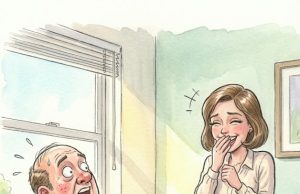
In a quaint village nestled among snow-laden fields and timeworn apple trees stood a weathered house with peeling walls and a groaning porch.
Many would pass it by without a second glance, dismissing it as a relic of the past. But to Marfa Ivanovna, this house was her world — the place where her fondest memories lived.
The walls echoed with her daughter’s first laughter, and the apple trees outside still whispered stories of golden summers long gone.
But time had its own plans. Her daughter, Vera, insisted it was time to move — to leave the countryside behind and join the family in the city.
Though practical, the idea shattered Marfa Ivanovna’s heart. As she sat on a worn stool amid her packed belongings, she stared blankly at her sleeping cat, Masya, who dozed on the windowsill, blissfully unaware that everything was about to change.

“Mom, are you ready?” Vera called, stepping into the room with an empty box.
“Yes,” Marfa replied faintly, never taking her eyes off Masya.
Vera could hear the quiet resistance in her voice.
She gently tried to convince her, promising better medical care, more comfort, even a rocking chair built by her son-in-law. “Masya will come too,” she added, sensing her mother’s deepest concern.
But Marfa’s heart was not so easily soothed. “You all move so fast,” she murmured. “But I’ve lived here my whole life.”
That night, sleep didn’t come.
She lay awake listening to the familiar sounds of home — the old wardrobe creaking, branches brushing against the windows, Masya purring at her feet.
She thought of the past: of holding Vera as a newborn, of sewing dresses after long days on the farm. Her eyes landed on the dresser where her late husband Nikolai’s photo stood.
His image, forever young and full of life, stared back at her. She reached for the frame and whispered, “Kolya, what would you do? Would you leave this place?”

Memories flooded her — Nikolai chopping wood, fixing the fence, laughing in the cold. She remembered the ache the day he died, the way the silence filled the house.
“You would have stayed,” she said through tears. Masya stirred in the other room, as if sensing her pain.
By morning, a cold frost hung in the air. Marfa stepped onto the porch, scarf wrapped tightly around her neck. Her neighbor, Anna Petrovna, called out. “You’re up early!”
“I couldn’t sleep,” Marfa replied. “How do you leave everything behind?”
“Have you made up your mind?” Anna asked gently. “The kids want me in the city,” Marfa said. “But what about you?” her friend pressed.
Marfa hesitated. “I think I belong here. But no one asks us old women, do they?”
Anna touched her arm softly. “Just don’t forget — Masya is worth more than any city.”
Those words struck a deep chord.
That cat had once saved her life. On a winter night years ago, Masya had woken her with loud meows. At first, Marfa thought the cat was just restless, but then she smelled smoke.

A fire had started near the stove. Thanks to Masya’s warning, she managed to put it out just in time. From that moment, Masya became more than a pet. She was family. A guardian.
Later that day, Vera handed Marfa a phone — her granddaughter Larisa’s voice burst through, bright and cheerful. “Grandma, I prepared your room! It’s sunny and cozy. I even cleaned it myself!”
Marfa smiled on the phone. “Thank you, dear.” But inside, doubt gnawed at her.
Could a soft bed replace the familiar creaks of her house? Could the scent of apple blossoms be found in the city?
At the station, everything felt foreign. The noise, the rushing people, the cold platform.
Marfa clutched Masya’s carrier tightly, feeling like a stranger in a world that no longer made sense. Vera tried to guide her gently. “Careful now, Mom. Just a few more steps.”
But fate had another twist.
As they walked toward the platform, someone shoved past, knocking the carrier from Marfa’s hands. The latch snapped open, and Masya bolted, terrified. “Masya!” Marfa cried, chasing after her.

The station faded. The only thing that mattered now was finding the cat. Vera ran too, leaving the bags behind.
They searched under benches, behind kiosks, asking passersby. No one had seen her. Desperation mounted.
“I can’t live without her,” Marfa whispered, slumping beside an abandoned kiosk. “She’s all I have left.” Her sobs shook her frail body, and even Vera was brought to tears.
Then, faintly, came a sound. “Meow.”
Both women froze.
“There!” Vera shouted, pointing toward the corner of the building. A flicker of hope lit Marfa’s eyes as they moved toward the sound. The train’s arrival went unnoticed.

The story of Marfa Ivanovna is not just about an old woman leaving her home. It’s about holding on to memories, to love, to life itself — and to a small cat who carried it all in her quiet purr.



















